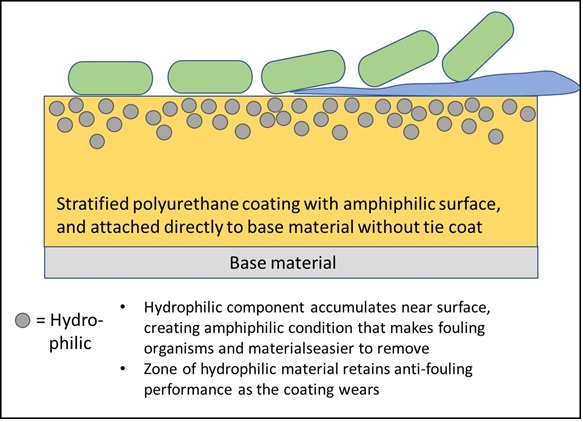“Dirt-Resistant” Coating Enables Easier Removal of Biofouling Organisms, Graffiti, Ice Etc. (RFT-380, 496, 551, 572, 588, 596, 610, 613)
Invention Summary
Scientists at NDSU have developed a series of coating technologies around a siloxane-polyurethane backbone. These coatings have amphiphilic surfaces, which reduce the adherence of fouling organisms and materials. These are self-stratifying coatings, which incorporate hydrophilic materials (e.g. polyethylene glycol (PEG) or poly(sulfobetaine methacrylate) (poly(SMBA)) within a hydrophobic base. As the coating cures, the hydrophilic component migrates toward the surface, which becomes highly irregular with respect to binding affinity for ‘ fouling’ materials and organisms. The hydrophobic sections interfere with materials that bind to charged surfaces. The hydrophilic sections interfere with materials that bind to uncharged surfaces. As a result, this technology creates an opportunity to develop a range of coatings that are easier to clean. Applications include oil-based marine and industrial coatings where polyurethane is a suitable base. This portfolio includes variations in both the hydrophobic backbone and the hydrophilic component, which leads to a range of fouling-release capabilities that are applicable to multiples marine and industrial settings.

Benefits to be found within this portfolio
- Introduces fouling release properties to polyurethane coatings
- Comparable fouling release properties to industry standard
- Mechanical performance significantly improved over silicone elastomers
- Excellent adhesion eliminates the need for a separate tie-coat
- Enables easier removal of fouling organisms and materials, making restoration of surfaces much more practical than with existing anti-fouling coatings
- Anti-icing performance on marine, airborne, and land-based surfaces
Patents
This technology is patented in the U.S. and is available for licensing/partnering opportunities.
Relevant Patents:
Contact
NDSU Research Foundation
info(at)ndsurf(dot)org
(701)231-8173
NDSURF Tech Key
RFT, 380, RFT380, 496, RFT496, 551, RFT551, 572, RFT572, 588, RFT588, 596, RFT596, 610, RFT610, 613, RFT613
Inquire about this technology >